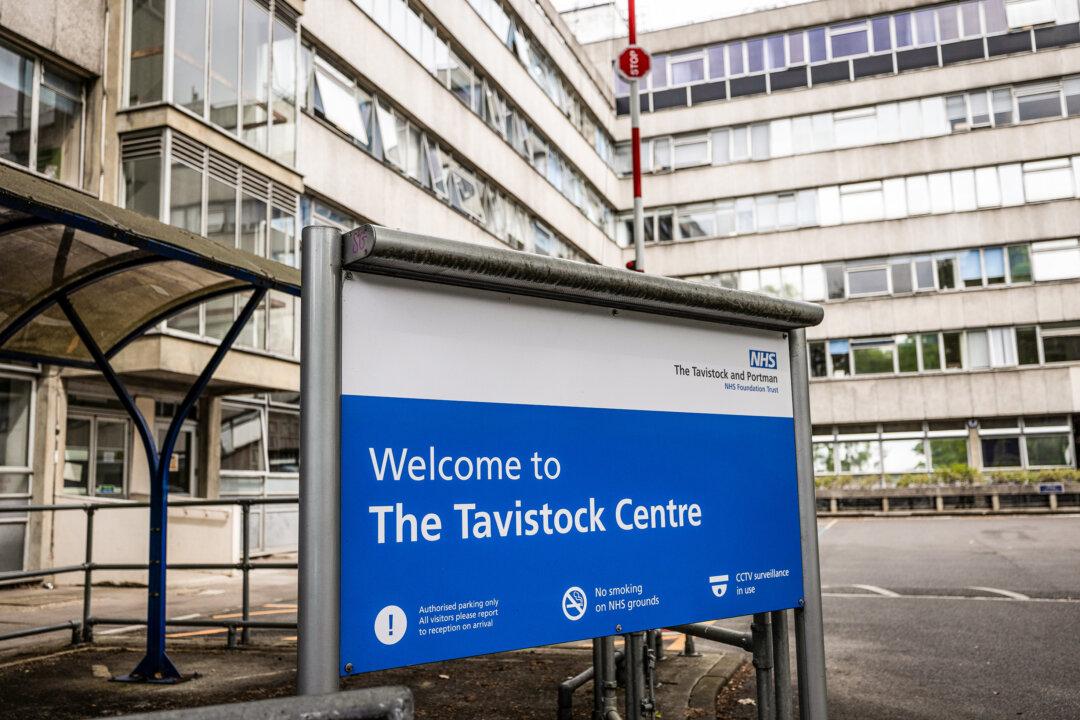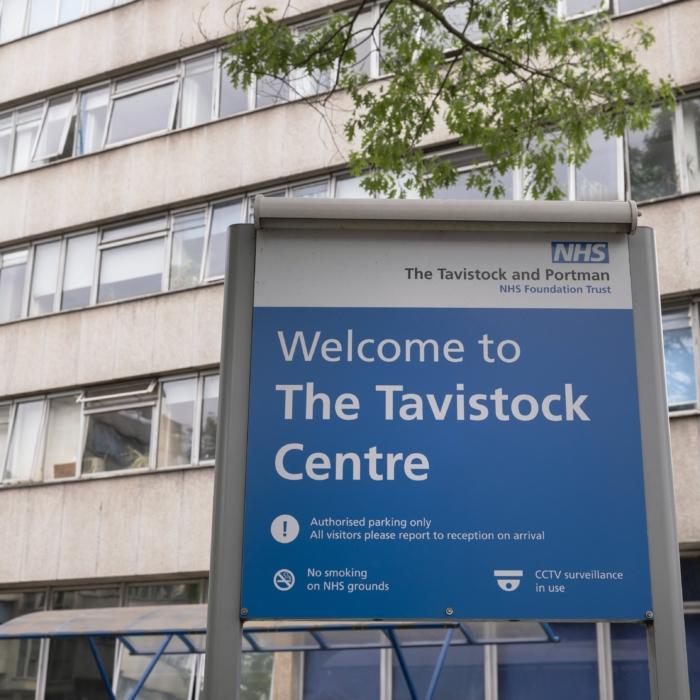A landmark review into NHS care for children who say they are suffering from gender confusion has been published, criticising the way children have been put on inappropriate paths to drugs and surgery, and aiming to set out a more “holistic” method of treatment.
Dr. Hilary Cass made 32 recommendations in total, finding that evidence for so-called “gender care”—which includes health care professionals simply affirming a child’s chosen gender and allowing young children to take puberty blockers—is “remarkably weak.”
The review was commissioned by NHS England and NHS Improvement in 2020 following a huge rise in the number of children and young people seeking help for issues with their gender in the past few years. In 2021–22, the NHS reported more than 5,000 referrals to the Tavistock gender identity clinic, up from just under 250 who were questioning their gender a decade earlier.
The final report on Dr. Cass’s review of gender identity services for children and young people runs to almost 400 pages and has been close to four years in the making, following concern from many professionals and campaign groups of a “social contagion” among young people claiming to suffer dysphoria.
The report called for more research into the effects on young people treated for gender confusion, finding there is currently “no good evidence on the long-term outcomes of interventions to manage gender-related distress.”
The recommendations do not go far enough for many campaigners concerned about transgender ideology being pushed onto children because it does not call for the outright banning of social transitioning or teaching that there are different “gender identities” in schools.
Dr. Cass found that results of previous studies have been “exaggerated or misrepresented by people on all sides of the debate to support their viewpoint.”
Such a puberty blocker trial is expected to be up and running by December—but Dr. Cass said that alongside this, there should be more research done into psychotherapy.
Care Should Be ‘Holistic’ and ‘Personal’
Health care professionals have been reluctant to openly discuss their views in a conversation which has seen people bullied and vilified on social media, the report found.Dr. Cass’s investigation heard from some parents who said they felt “forced” to affirm their child’s gender identity as they were scared of being labelled as “transphobic,” although other parents said transitioning had boosted their child’s social life and made them more popular.
The care of children and young people questioning their gender identity “needs to be holistic and personal,” the report said, following concerns that many children on the autistic spectrum or with mental health problems besides gender dysphoria are being allowed to “transition.”
The report calls for “an individualised care plan” for patients which should include screening for neurodivergent conditions, including autism, as well as a proper mental health assessment. It found that children who suffered abuse or serious problems at home were more likely to believe they were “transgender.”
Following the scandal over the treatment of young children at the Tavistock clinic in north London and its closure in March, all facilities offering gender care “must operate to the same standards as other services seeing children and young people with complex presentations and/or additional risk factors.”
In the wake of revelations that children as young as three were referred to the Tavistock clinic, the review said the approach to caring for younger children should be different from that offered to teenagers.
But there should be no lower age limit to accessing support and parents and families should be helped to ensure options “remain open and flexible for the child,” Dr. Cass recommended.
For pre-pubescent children, there should be a “separate pathway” of care within each regional network of services, and young children and their parents should be prioritised for “early discussion with a professional with relevant experience.”
Young people should not just be transferred to adult services once they turn 18, but instead there should be a “follow-through services” for 17 to 25-year-olds, with regional centres either extending the age range of their patients or through “linked services, to ensure continuity of care and support at a potentially vulnerable stage in their journey.”
‘Referrals Should Come From a Medical Professional’
The report found that referrals to the now-closed Gender Identity Development Service (GIDS) at the Tavistock clinic were “unusual” in that they were accepted directly from GPs and from non-health care professionals including youth workers and teachers.Dr. Cass said this practice should end and she supports proposals from NHS England for all referrals to come from medical professionals.
Following concerns from many politicians, teachers, and campaigners about the damage being done in allowing children to “socially transition,” Dr. Cass found that those who were allowed to change their names and pronouns at an earlier age or before being seen in clinic “were more likely to proceed to a medical pathway.”
But she found “no clear evidence” that allowing such a transition has any positive or negative mental health outcomes and “relatively weak” evidence for the effects in adolescence.
Partial transition “may be a way of ensuring flexibility,” the review said, adding that appropriately trained clinical staff should advise on the risks and benefits of social transition “referencing best available evidence.”
The report warns parents should be careful not to unconsciously influence the child’s “gender expression.”
Dr. Cass found there is a shortage of staff with the required skills to meet the needs of gender-confused young people. She said professionals have been reluctant to engage in the clinical care of gender-questioning children and young people due to weak evidence in the area, a lack of consistent professional guidance and support, and long-term implications of making the wrong judgment about treatment options.
She said there is a need for staff with the correct mix of skills to treat those who will go on a medical pathway, and those who can be helped by psycho-social therapy, and this should include a wide range of specialists such as paediatricians, psychiatrists, clinical nurse specialists, social workers, specialists in neurodiversity, speech and language therapists and occupational health specialists.
Endocrinologists and fertility specialists should also feature “for the subgroup for whom medical treatment may be considered appropriate.”
Separate Service for ‘Detransitioners’
NHS England should consider whether a separately commissioned service is needed for people who wish to “detransition”—meaning they wish to go back to presenting as their own sex and stop taking cross-sex hormones—given that people who regret going through this process might be hesitant to return to the same service they had previously used.Given that some people may have had surgery that cannot be undone, the review says that “better services and pathways” are needed for a group of whom many are “living with the irreversible effects of transition and no clear way to access services.”
The Private Sector
The report addresses concerns that some children will still be able to gain access to puberty blockers through private providers, many of whom have online clinics and are registered abroad.As puberty blockers are no longer being prescribed to children on the NHS, the report recommends that no GP should be expected to “enter into a shared care arrangement with a private provider” if a young person has been given access to them via that route.
Dr. Cass said GPs had “expressed concern about being pressured to prescribe hormones after these have been initiated by private providers and that there is a lack of clarity around their responsibilities in relation to monitoring.”
The report added that the Department of Health and Social Care and NHS England must “consider the implications of private healthcare on any future requests to the NHS for treatment, monitoring and/or involvement in research,” noting that a young person’s eligibility to take part in the NHS study into puberty blockers could be affected if they took puberty blockers outside the study.
The GIDS at the Tavistock and Portman NHS Foundation Trust closed two weeks ago, with two new regional hubs launched in London and the north of England in a bid to move away from a single-service model.
Professor Steve Turner, president of the Royal College of Paediatrics and Child Health, said the review was a “massive undertaking” and the college will “closely consider the report’s recommendations.”
“For some time now, rising demand for gender identity services across the UK has led to significant waiting times for children with gender-related distress, leaving these young people particularly underserved and vulnerable,” he added.
“It’s obvious that more resources are needed to address the holistic health needs of this young cohort.
“As a college, we are clear that the needs of children and young people should be front and centre of how services are designed to care for them.”
Dr. Lade Smith, president of the Royal College of Psychiatrists, said, “Children who are gender questioning also commonly experience mental illness.
“It is extremely important that every child who is gender questioning has timely access to services that are holistic and respond to their individual needs.”
An NHS England spokesperson said the health service is “very grateful” for Dr. Cass’s work.
They added: “The NHS has made significant progress towards establishing a fundamentally different gender service for children and young people – in line with earlier advice by Dr. Cass and following extensive public consultation and engagement – by stopping the routine use of puberty-suppressing hormones and opening the first of up to eight new regional centres delivering a different model of care.
“We will set out a full implementation plan following careful consideration of this final report and its recommendations, and the NHS is also bringing forward its systemic review of adult gender services and has written to local NHS leaders to ask them to pause offering first appointments at adult gender clinics to young people below their 18th birthday.”







